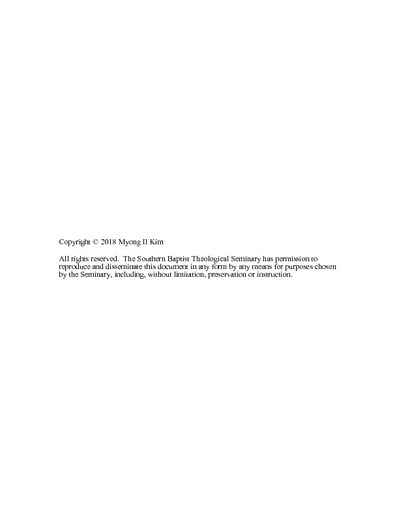| dc.description.abstract | This dissertation examines the role of the Davidic Messiah, who is the agent of God’s judgment in Romans 1:18–4:25. It may be summarized in two theses: First of all, the Davidic Messiah was expected in the Old Testament and the Second Temple Jewish writings, which establish the foundation for Paul’s Davidic Messiah Christology in Romans. Second, the language in the role of the agent of God’s judgment cannot be identified with the term faithfulness.
Chapter 1 introduces the thesis and presents a history of research. Chapter 2 investigates the Davidic Messiah in the Old Testament, and the Davidic Messiah who executes and accomplished God’s just judgment in righteousness. I contend that the faithfulness language is unfamiliar in God’s judgment through the Davidic Messiah.
Chapter 3 explores the Davidic Messiah in the Second Temple Jewish writings. Continuously, the Davidic Messiah is described as the agent of God’s judgment. In his execution of God’s judgment, righteousness is focused on, rather than the Messiah’s faithfulness.
Chapter 4 examines the Davidic Messiah, Jesus, who is preached in Paul’s gospel in Romans 1:3–4. While some scholars assert the Messiah’s faithfulness in the gospel of God related to Romans 15:12, Paul stresses God’s righteous judgment through the Davidic Messiah in Romans 15:12. Paul focuses on God’s judgment in his gospel in Romans, and the Davidic Messiah is the agent of God’s judgment in the context of Romans 15. In Paul’s emphasis, the Messiah’s faithfulness does not appear. Instead, the Messiah’s judgment in equity and righteousness can be found.
Chapter 5 seeks the Davidic Messiah in the flow of Paul’s argument in Romans 1:18–4:25. He is the agent of God’s impartial judgment as in Romans 2:16. The Davidic Messiah executes the justifying righteousness (1:17), which is God’s wrath (1:18). Furthermore, while the Messiah Jesus offers himself as the once-for-all sacrifice to atone for sinners (Rom 3:25), it suggests that the Davidic Messiah accomplishes God’s righteousness through faith in him (3:22). Moreover, he justifies sinners in his suffering and resurrection (4:25). In this discourse, the righteous judgment over sinners through the Davidic Messiah is Paul’s main concern, rather than the Messiah’s obedient faithfulness. | en_US |

